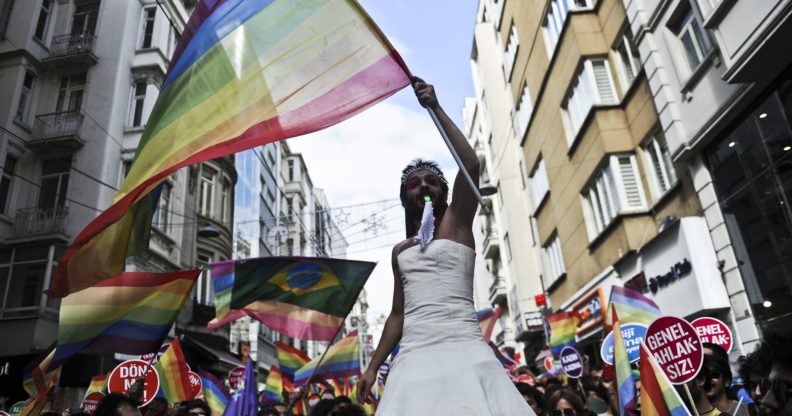LGBT+ acceptance in Turkey, where a majority of the population is Muslim, is at an all-time high

(OZAN KOSE/AFP/Getty Images)
Almost half of people in Turkey think that LGBT+ people should have equal rights, nine percent more than last year, according to a survey.
Kadir Has University in Istanbul has been conducting the survey annually since 2016.
The purpose is to be able to compare people’s views over time and create a database for gender studies in the country, where around 60 per cent of the population is Muslim.
In the survey, which is called ‘Perceptions of Gender Equality’, people in Turkey are asked questions about equality between men and women, marriage and LGBT+ people.
In 2020, 45 per cent of people thought that LGBT+ people should have equal rights.
This is up from 36 per cent in 2019, 44 per cent in 2018, 38 per cent in 2017 and 33 per cent in 2016, the first year the survey was carried out.
However, 77 per cent of the people who took part also agreed with the statement: “Same-sex relationships are against our social norms.” This is up 15 per cent from last year.
A separate survey by Kadir Has University in 2019 found that 46.5 per cent of Turkish people wouldn’t want a “homosexual” neighbour. This was slightly down from 55.3 percent of those asked the same question in 2018.
LGBT+ rights in Turkey.
Despite homosexuality not being illegal in Turkey, there have been a number of large-scale LGBT+ events that have been banned in the country in recent years.
In November 2017, the Turkish government in Ankara banned LGBT+ Pride events citing “public morality”.
According to Euronews, instead of placing an absolute ban over such demonstrations taking place, an increased level of security “must be ensured”.
Back in July 2018, officials who had forbidden Istanbul Pride from taking place were challenged by thousands of defiant marchers – many of whom were waving rainbow flags in protest – who gathered near the city’s famous Istiklal Avenue and Taksim Square.
Around the time, it was reported that police were threatening to arrest anyone that “looks gay, wears rainbows or bright feminine colours, or has on too short of shorts”.
The activists were met with hostility by local officials who used high-pressure water canons and rubber bullets in an attempt to disperse the crowd.

